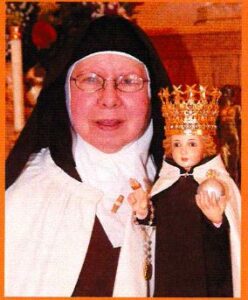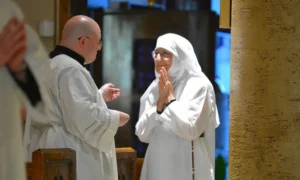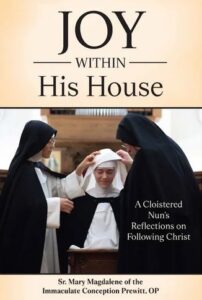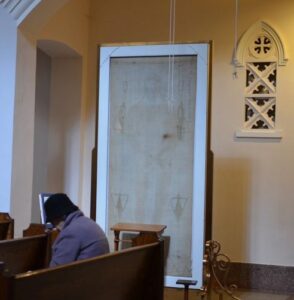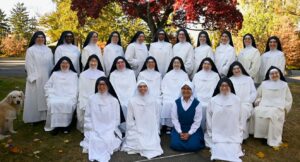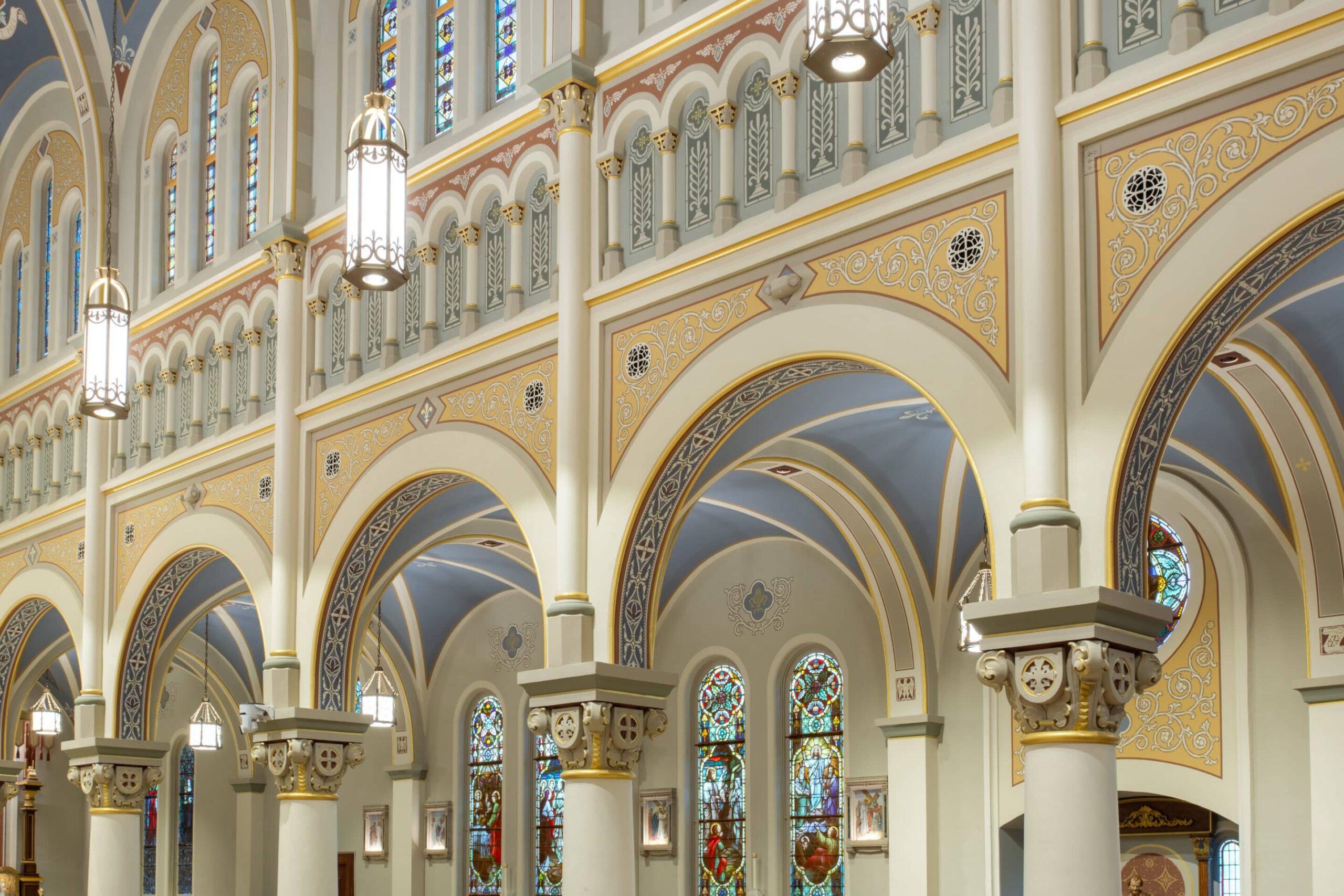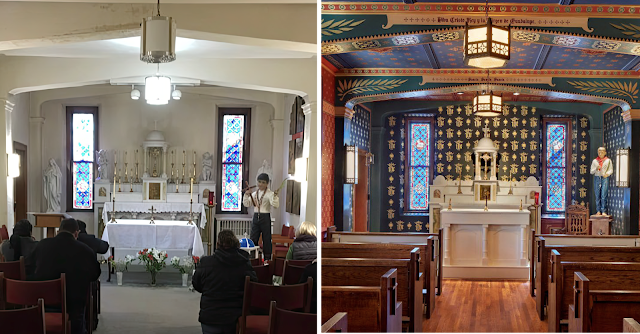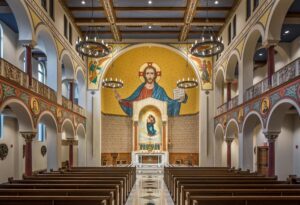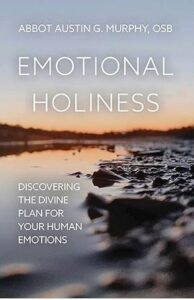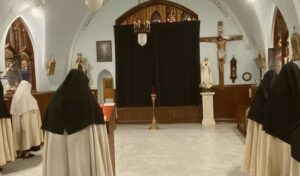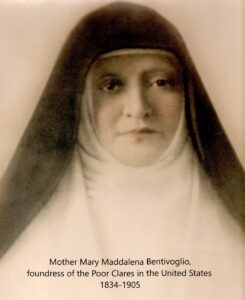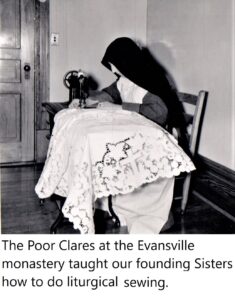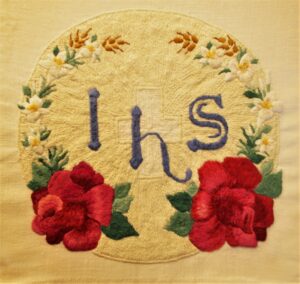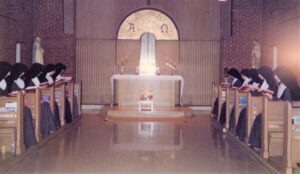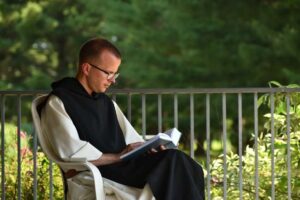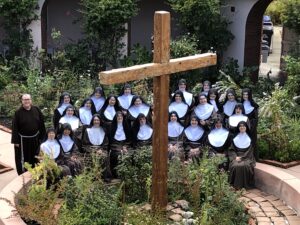
The triennial federal assembly of the Poor Clare Federation of Mary Immaculate in the United States of America was held October 8 – 15, 2025, at the beautiful Monastery of the Poor Clares in Los Altos Hills, California. Each of the twelve member monasteries (Alexandria, VA: Barhamsville, VA; Belleville, IL; Chicago, IL; Cleveland, OH; Kokomo, IN; Los Altos Hills, CA; Rockford, IL; Roswell, NM; St. Louis, MO; Santa Barbara, CA; Sauk Rapids, MN) was represented by its abbess and a delegate elected by that community’s solemnly professed nuns.It was like a foretaste of heaven to greet sisters from all over the country and to experience a joyous unity of spirit throughout the assembly.

Mother Mary Angela, P.C.C., of Roswell, federal president since 2023, presided over the chapter, and was re-elected to serve a second term. Assisting her will be: Mother Mary Giovanna (Belleville, IL) as first federal councilor; Sister Miriam (Kokomo, IN) as second federal councilor; and Mother Marie Colette (Los Altos Hills, CA), as third federal councilor. This was the first assembly in which three councilors were elected, a change made to accord with the directives in Cor Orans.
The sessions of this assembly focused mainly on the revision of our federation’s Constitutions, and this blessed work will continue as the new triennium unfolds. The presence of Father Larry Webber, O.F.M. Cap., our religious assistant, enriched our discussions greatly, as he added his own perspective and vast experience to each session’s subject of focus.
One very special joy of the federation assembly is the sharing which occurs one-on-one among the capitulars before, after and in between sessions, and in every other possible free moment that can be found! These sharings, often taking place outdoor in the beauty of the monastery garden, deepen our sisterly unity in our shared ideal, and enrich us with a greater knowledge of each federated community.

During an afternoon session on the day of the federation elections, one of the delegates politely interrupted the discussion in process to exclaim with true Franciscan joy and simplicity, “Pardon me, but if you look out that window, you’ll see that there’s a rainbow!” And again, in true Franciscan style, the capitulars immediately jumped up to see the glorious reminder of God’s undying love and everlasting covenant, wrought in the sky by the Divine Artist himself. It was an unforgettably beautiful sign of hope in this assembly specifically themed after the Jubilee Year of Hope.
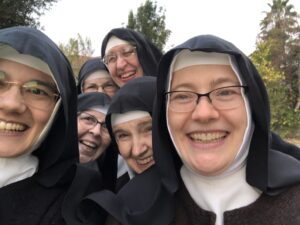 Another hallmark of this assembly was the 150th anniversary on Sunday, October 12, of Mother Mary Maddalena Bentivoglio’s arrival in the United States. Our sisters from Sauk Rapids and Saint Louis brought relics and memorabilia from Mother Maddalena, presenting an outline of the history of our Order from its beginnings in Assisi to the present day. Among the relics on display was Mother
Another hallmark of this assembly was the 150th anniversary on Sunday, October 12, of Mother Mary Maddalena Bentivoglio’s arrival in the United States. Our sisters from Sauk Rapids and Saint Louis brought relics and memorabilia from Mother Maddalena, presenting an outline of the history of our Order from its beginnings in Assisi to the present day. Among the relics on display was Mother  Maddalena’s own tunic, carefully kept these many years by our Sauk Rapids community. The St. Louis delegation regaled us during one of our recreation hours with the story of how, on their train trip from Missouri to California, they had carried the large bulletin board bearing photographs which told the pictorial story of the history of our Order – along with their regular luggage, and a big box of homemade bread for the capitulars! All agreed it was a story worthy of the Fioretti and should be written up in full for posterity, and they themselves felt they had been granted a share in Mother Maddalena’s own difficulties encountered along her pilgrim way as she ventured across the ocean to bring Poor Clare life to the United States.
Maddalena’s own tunic, carefully kept these many years by our Sauk Rapids community. The St. Louis delegation regaled us during one of our recreation hours with the story of how, on their train trip from Missouri to California, they had carried the large bulletin board bearing photographs which told the pictorial story of the history of our Order – along with their regular luggage, and a big box of homemade bread for the capitulars! All agreed it was a story worthy of the Fioretti and should be written up in full for posterity, and they themselves felt they had been granted a share in Mother Maddalena’s own difficulties encountered along her pilgrim way as she ventured across the ocean to bring Poor Clare life to the United States.

In her closing address on the final day of the assembly, Mother Angela quoted a circular letter written by St. Alphonsus Liguori to his novices: “It is only by lifelong sacrifice on the part of all concerned that a religious order can be founded, and it is only by the self-same sacrifice that its fervor can be maintained. The members of a religious family at any given moment have in their hands the making or the marring of their institute. The fact that it has a great name, was founded by a saint, or produced saints in the past, will not save it or them if their lives are tepid. If every novice, even, would remember that the honor of his order is committed to his charge, individuals and institutes would not fall into relaxation as they do.”
![]() She exhorted the capitulars to go forth from this Assembly in an attitude of gratitude and wonder, which are prerequisites for a life of contemplation. Echoing Our Lady of Guadalupe’s words to St. Juan Diego, she encouraged each one to “Go now, and do your part.” As we go forward in our joyful observance of the Gospel as pilgrims of hope, each Poor Clare in our Federation of Mary Immaculate desires to hold high the light of hope for our world, so in need of the radiant light which Francis and Clare have bequeathed to their spiritual daughters.
She exhorted the capitulars to go forth from this Assembly in an attitude of gratitude and wonder, which are prerequisites for a life of contemplation. Echoing Our Lady of Guadalupe’s words to St. Juan Diego, she encouraged each one to “Go now, and do your part.” As we go forward in our joyful observance of the Gospel as pilgrims of hope, each Poor Clare in our Federation of Mary Immaculate desires to hold high the light of hope for our world, so in need of the radiant light which Francis and Clare have bequeathed to their spiritual daughters.
For more information: cloisteredcontemplativepoorclares.org
